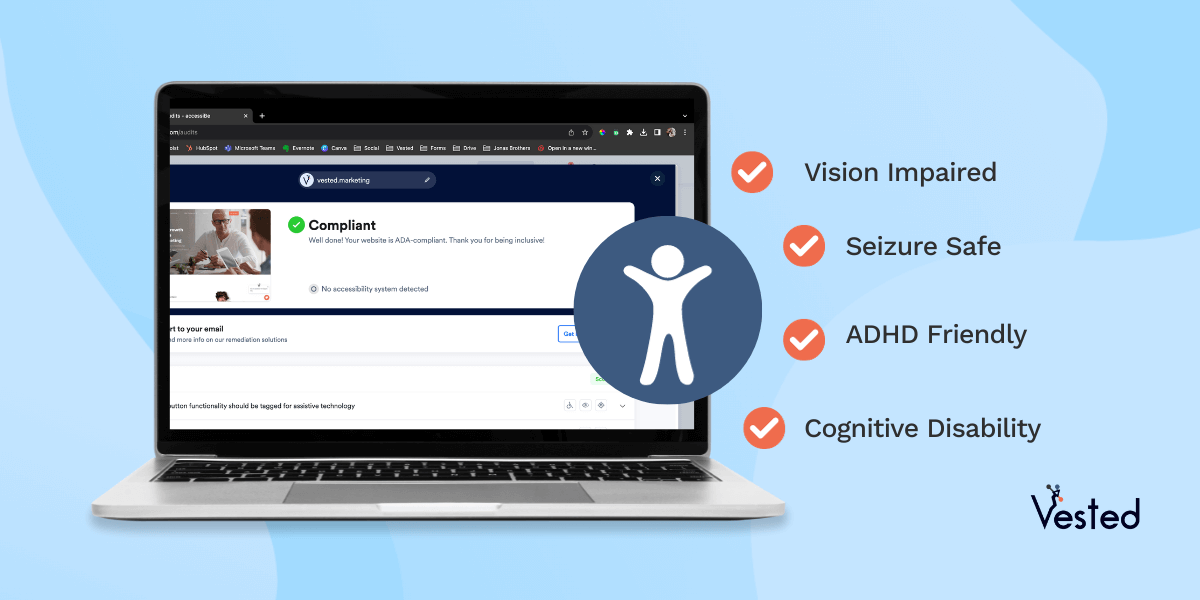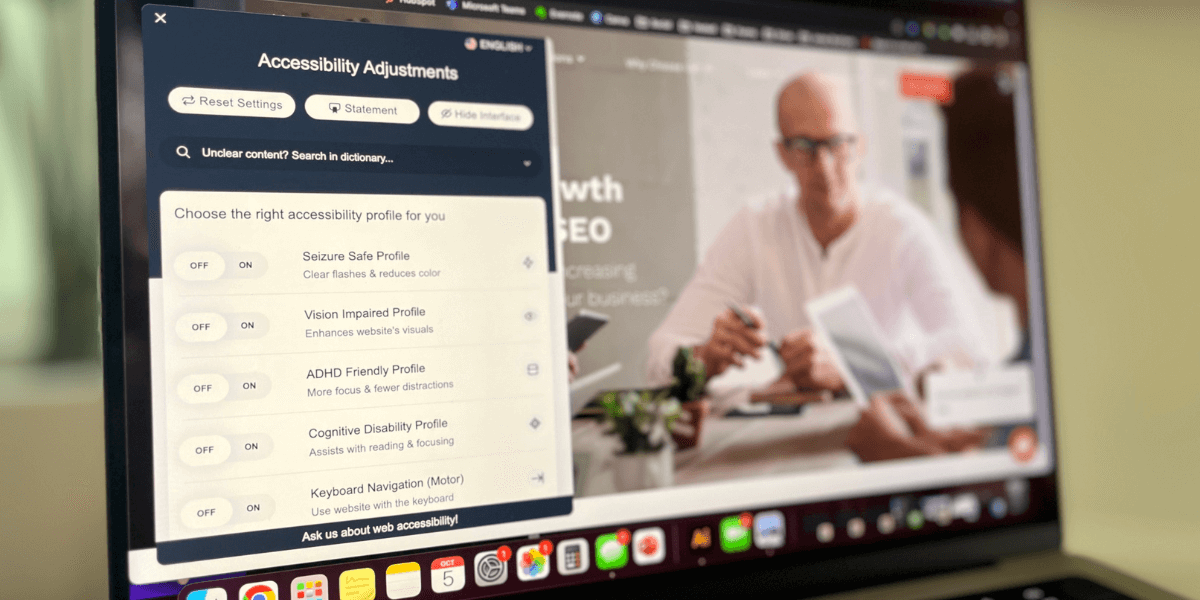Is ADA Compliance Mandatory for Websites?
In today's digital age, ensuring accessibility for all is not only a moral responsibility but also a legal obligation. The Americans with...

4 min read
![]() Vested Marketing
:
Updated on August 16, 2024
Vested Marketing
:
Updated on August 16, 2024
Is your website accessible and inclusive? How can you tell? Making sure your website is accessible for those with a disability is not only required by law, but its the right thing to do, and it also offers several other benefits.
As HubSpot Gurus and SEO website builders, Vested Marketing is taking a stance to ensure that our clients are not only familiar with the ADA and its relation to web accessibility, but to also minimize the risks of legal ramifications.
In this article we will cover:
ADA stands for The Americans with Disabilities Act. In 1990, the ADA was created to provide comprehensive civil rights protections to individuals with disabilities (in employment, state and local government services, public accommodations, transportation, and telecommunications). The ADA is America’s most important law regarding accessibility and civil rights for people with disabilities, including web accessibility.
Since 2018, a clear consensus has emerged that ADA compliance covers the online world.
As the internet becomes more essential and websites play a more significant role in how consumers interact with businesses, the way we apply ADA to web accessibility also has to change. Disability rights activists, legal scholars, and court rulings have agreed that websites, internet portals, and online stores must be accessible to people with disabilities.
In 2022, the Department of Justice (DOJ) reaffirmed and clarified its 2018 ruling that websites are places of public accommodation and are subject to the ADA’s requirements of general non-discrimination and effective communication.
WCAG stands for Web Content Accessibility Guidelines. The WCAG is a massive guidebook that explains how accessible and inclusive websites should look and operate for people with disabilities. While the WCAG standards are stated in the ADA law requirement itself, the WCAG has been widely accepted as the industry standard for being ADA-compliant.
If you abide by the WCAG guidelines, your website should be considered compliant and to be safe from litigation.
The ADA is not the only accessibility-focused legislation that could pertain to your business or website. Depending on your business operation and location, below are a few other laws about web accessibility that you should know about.
Section 508 is a set of rules that apply to government entities and organizations that receive federal funding, as part of the Rehabilitation Act of 1973. Any federal agency or government-funded organization must build and maintain all of their information and communications technology (ICT) so that they are accessible to people with disabilities. This means that if a business works or plans to work with a government entity, it must comply with section 508.
The Accessibility for Ontarians with Disabilities Act, 2005 (AODA) is an Ontario, Canada law that outlines standards through which organizations must become more accessible to people with disabilities. Under the AODA, private or non-profit businesses with at least 20 employees in Ontario must file an accessibility compliance report, which is done through a standardized form provided by the government of Ontario every three years.
The UNRUH Civil Rights Act (California Civil Code Section 51) protects from discrimination by all business establishments in California, including housing and public accommodations, because of age, ancestry, color, disability, national origin, race, religion, sex, and sexual orientation.
The New York City Human Rights Law (NYHRA) is a state and city-level anti-discrimination legislation parallel to the Americans with Disabilities Act (ADA). The NYHRA protects people with disabilities from discrimination at work, home, and public spaces.
There has been a significant rise in web accessibility demand letters and lawsuits. In 2022, there was an all-time high of ADA web accessibility lawsuits, with 3,250 cases filed. The number of cases filed only represents 3% of of demand letters, which means that more than 100,000 business owners received demand letters.
Organizations and businesses can be fined up to $150,000 for ADA violations, while the average ADA website compliance lawsuit settlement typically ranges from $20,000 to $50,000.
With the rise in legal claims against non-ADA-compliant businesses, it is important to be aware of the potential consequences and ensure that your website is accessible and compliant with the ADA.
The WCAG essentially boils down to your website needing to have four principles: Perceivable, Operable, Understandable and Robust.
Having an accessible and inclusive website is not only the right thing to do, but it also offers several benefits, such as increased traffic with improved SEO and eligibility for tax credits.
www.Vested.Marketing is now an ADA-compliant website (check out the blue man to the left of your screen).
And we're offering web accessibility solutions for WCAG and ADA compliance for you, too!
Next Steps:
ADA compliance is required for all industries, including engineering, fabrication, manufacturing automation, healthcare, and more. Let's see where your website stands with accessibility and inclusivity. Get a free ADA Compliance Audit. Once we complete your audit, we will follow-up with insights and recommendations on how to make your website ADA compliant and keep you safeguarded from litigation.
Have more questions? You can contact us here!
![]() As a certified HubSpot Partner Agency, we not only understand the benefits of using the inbound marketing platform to increase traffic and engagement, improve SEO, generate leads, design effective websites and boost sales, we know how to make it happen.
As a certified HubSpot Partner Agency, we not only understand the benefits of using the inbound marketing platform to increase traffic and engagement, improve SEO, generate leads, design effective websites and boost sales, we know how to make it happen.
We are digital and inbound marketing experts, SEO gurus and top-notch website developers.
Our team of Engineers Turned Marketers can help get you noticed - for a more innovative and effective way to reach customers, or provide a more seamless way for companies to find your services. Inbound Marketing has no limit to industry, serving from Crypto & NFT, mining, oil and gas, technology & automation, engineering, technology, construction, healthcare, to industrial & manufacturing.

In today's digital age, ensuring accessibility for all is not only a moral responsibility but also a legal obligation. The Americans with...

The CDC estimates that 1 in 4 adults in the United States (or 20% of the world's population) has a disability, which involves many people having to...

Ensuring that everyone, regardless of their abilities, can access and navigate your online presence is not just good practice, it's a legal...